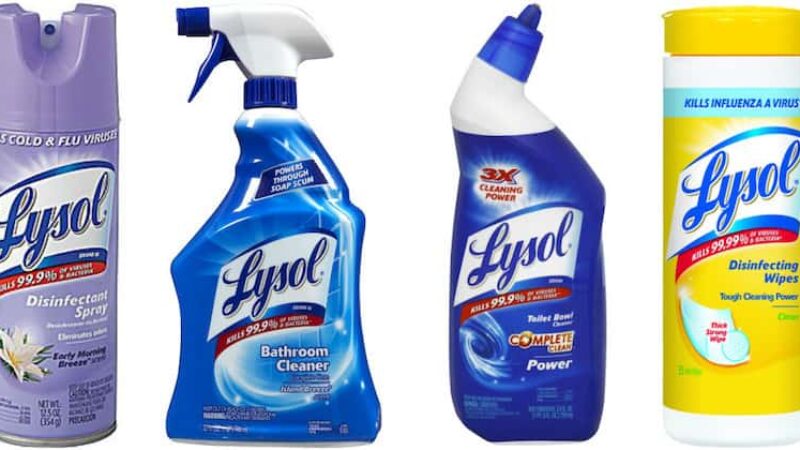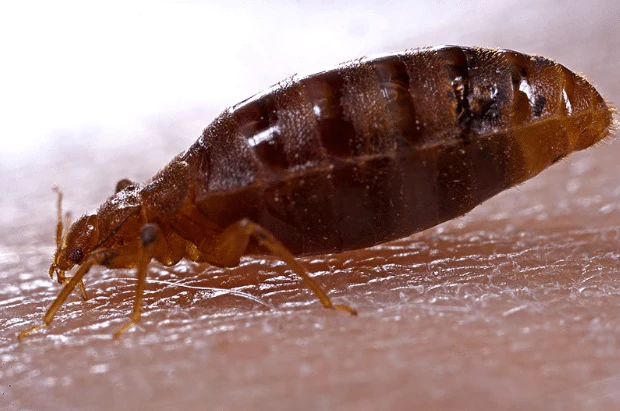Does Lysol Kill Bed Bugs? – the Ultimate Gude

Despite the fact that Lysol can kill bed bugs, it is not advised. Spraying Lysol directly on the bed bugs is necessary for it to work. Lysol dried spray appears to have no impact on bed bugs, according to the evidence. The Lysol manufacturer does not suggest the spray as an insect repellent.
Let’s examine all the information you require to eliminate your bed bug problem.
Table of Contents
What is Lysol Spray?
The chemical-based Lysol spray is a common household cleaner. It is primarily used to eliminate bacteria and germs in private residences and other communal areas like hotels and offices. We frequently run into numerous invisible bacteria and viruses while performing household tasks. Germs on shared surfaces can be eliminated with Lysol spray. The removal of bedbugs from your home can also be accomplished successfully with Lysol spray. When sprayed directly on infested areas, Lysol effectively eradicates bedbug infestations. The potent chemical reaction is too strong for bedbugs to handle, and they eventually suffocate to death while also suffering an itchy reaction on their outer skin layer. Bedbugs are unable to survive when exposed to Lysol spray, which also instantly kills any small bedbugs that are still in the egg stage.
Can Lysol Kill Bed Bugs?
When treating the infestation, get all of the bed bugs completely wet with Lysol’s alcohol and propellants to ensure their death.
Because of this, Lysol is a poor choice for treating an infestation, according to experts.
Does Lysol Recommend Use Lysol for Bed Bugs?
Does Lysol make the claim that it can eradicate bed bugs? The website does not make this claim, though.
They mention dirt and bacteria on the page for How to Clean a Bedroom. However, they make no mention of using insecticides like Lysol.

How Lysol Kills Bed Bugs?
Lysol is a disinfectant that uses chemicals to clean surfaces and kill germs. Lysol wipes and sprays are frequently used to disinfect surfaces in homes.
Lysol has its uses when used as an anti-pest solution, no doubt. Against bedbugs, Lysol causes a chemical irritation on the skin, but that’s not what kills them.
Like other creatures with an open circulatory system, bed bugs do not breathe through their mouth and inhale air into their lungs; instead, they rely on their spiracles, openings on the surface of their body, to breathe in air.
As such, Lysol predominantly kills bed bugs by actually interfering with this breathing process, causing them to be unable to breathe in air and die.
You might be wondering whether you’d get the same effect by simply spraying the bed bugs with water, but there are several reasons why Lysol is a more effective killing agent than plain old water.
First, the surface tension of the chemical components of Lysol certainly makes it more effective at penetrating the pores.
Lysol also absorbs well thanks to its surface tension, enabling it to kill the bugs effectively by physically blocking the spiracles.
Lastly, and most importantly, Lysol is sticky thanks to benzalkonium chloride and will cling to the insect’s body, unlike water, which will roll off in beads.
As such, Lysol’s stickiness is what makes it effective at stopping bedbugs in their tracks and killing them eventually, although it shouldn’t be confused with insecticides. (Check for What Attracts Bed Bugs)
How Quickly Can Lysol Kill Bed Bugs?
As previously stated, Lysol kills bed bugs by denying them oxygen. You would be mistaken if you believed that this would cause death within five minutes.
Humans can only survive hypoxic conditions for a few minutes before the affected person is at risk of dying. Bed bugs, on the other hand, can last for hours before they succumb to this condition.
To clarify, spraying Lysol onto a bed bug will immediately cause it to be incapacitated. This is due to the fact that alcohol causes a bed bug’s organs to burn, destroying its physiology and impairing its ability to move. Unfortunately, it will not die for another 8 or more hours.
Of course, while it’s lying helpless, you could just squash it and finish the job, but it’s certainly not encouraging that the spray doesn’t kill them on contact.
Can Lysol Kill Bedbug Eggs?
The possibility of adult bedbugs producing bedbug eggs is among the worst aspects of dealing with a bedbug infestation.
These can be quite difficult to spot, and sometimes, just spraying down whole areas with disinfectant can cover your bases so that the eggs are destroyed. Lysol is effective at instantly killing bedbug eggs because it has a high alcohol content.
As mentioned, the alcohol is highly toxic to bedbugs, and the helpful stickiness of the compounds in The chemicals from the Lysol disinfectant spray make sure that they will adhere to the eggs and kill them almost immediately.
Steps to Follow When Using Lysol
You might have trouble sleeping if bedbugs invade your home. Bedbugs strike at night, attaching to your skin and ruthlessly sucking blood. Take action right away if you notice bed bug activity in your bed or on your common sitting areas to prevent the tenacious bugs from taking over your entire house. One of the best ways to get rid of bed bugs is with Lysol spray. It functions both as a disinfectant and a bedbug killer. Get your Lysol spray and start the process of completely eliminating the dangerous pests as soon as you identify where the bed bugs are hiding. Remove all the unnecessary items from your room to effectively get rid of bedbugs in your home. Sort your laundry, then use hot water to wash all of the soiled items. The simplest way to eliminate bedbugs initially is to place them in a hot environment because they cannot survive there. All of your home’s carpeted areas, furniture, bookcases, computers, and other dry areas should all be vacuumed to remove any potential bedbug hiding places. The tiniest insects in their hiding places are removed by vacuum cleaning. Steam your pillows and mattresses, then encase them safely. Your beds and pillows will be protected from bedbugs thanks to this measure. You must kill them right away because they will hang out in the folds where they are simple to spot. To prevent painful bites on your face and neck, use bed bug repellent. In all the affected areas of your house, spray Lysol. Spray Lysol disinfectant to eliminate any remaining bedbug eggs and adult bugs hiding in your bed. All the pests in the infected areas will be permanently eliminated with its assistance. In areas where bedbugs tend to hide, such as furniture cracks and frames, spray Lysol chemical.
How Do You Identify Bed Bugs?
It’s crucial to be certain that you are dealing with bed bugs before you begin treatment.
Here are some indications that you might have a bed bug infestation!
- You wake up itchy.
- You just purchased some used furniture or a used mattress.
- Your pillows or sheets have blood stains on them.
- You notice dark stains on your bed sheets, walls, or mattress. (It’s possible that this is bedbug waste.)
- You spot the skin sheddings or egg casings of bedbugs.
- You detect an unpleasant odor. (The scent glands of the bed bug may be the source of this.)
How to Get Rid of Bed Bugs?
When it comes to dealing with the bed bug issue, you have a few different options.
You could choose to go the do-it-yourself route or take the easy route and contact an exterminator for assistance.
The following steps should be followed if you choose to eliminate the bed bugs on your own.
General Cleaning
All of your clothes, bedding, linens, curtains, and other items should be washed in hot water.
Use a dryer to dry them when you’re finished.
They should be dried for 30 minutes at the highest setting.
Put any fabric-based items, such as stuffed animals or shoes, that can’t be washed in the dryer for at least 30 minutes.
Scrub the Mattress
You will need to remove bed bugs from the mattress if you have them.
The first thing you should do is scrub the mattress with a stiff brush to get rid of the bedbugs and their eggs.
Since bed bugs frequently hide in seams, pay close attention to them.
Vacuum the Mattress
After cleaning the mattress with a hard brush, it’s crucial to complete this step right away.
They may still be on the mattress despite the stiff brush’s best efforts to loosen any eggs or bugs.
To get the eggs and bus out of your bed, vacuum it thoroughly.
Don’t forget to vacuum the neighborhood as well.
After vacuuming, throw away the vacuum cleaner bag containing the insects and their eggs.
Put the bag in a plastic bag before throwing it away by placing it in the trash can.
Don’t forget to dispose of it in the outdoor trash can.
You run the risk of reinfecting the house with bugs if you leave the vacuum bag inside.
Encase the Bed
A tightly woven zipper cover is what you should purchase to cover your mattress.
Although less comfortable, a plastic cover will do the best job of preventing the bugs from escaping.
Keep the cover on your mattress for at least a year.
Bed bugs can survive without food for up to this amount of time.
The risk of reinfestation increases if the cover is removed before a year.
Get Rid of Infested Furniture
Get rid of the used furniture as soon as you can if it was something you brought into the house that started the infestation.
Avoid selling it or giving it away to avoid spreading the infestation to someone else’s home.
The safest course of action is to dispose of infested furniture in the trash.
Upcycling is not an option for this product.
Seal Up the Hiding Spaces
Wall crevices and even wallpaper that is peeling can be home to bed bugs.
If there are any cracks in the room, you should make sure to seal them up to stop bed bugs from hiding there.
If any wallpaper is separating from the wall, re-glue it.
If you haven’t cleaned your room in a while, use this as an opportunity to do so!
Clean Up Your Room
You should tidy up any clutter that may be in the space.
Eliminating clutter will help you catch bed bugs before they escape your notice because they can hide in a variety of locations.
Make sure to wash and dry anything made of fabric on high heat.
As bed bugs may also hide there, throw away any trash that may be nearby or under the bed.
Extermination
The bugs won’t be gone even after all this cleaning!
You will still need to use chemicals to get rid of them.
Use of substances made specifically for use in beds and bedrooms is crucial.
You don’t want to put your health at risk, first of all.
This is one of the reasons Lysol shouldn’t be used to treat bed bugs.
The treatment must be suitable for your mattress, as the second thing you want to check.
Numerous chemicals have the ability to harm fabric.
You can extend the life of your mattress by using a treatment specifically designed for mattresses.
It should be specifically noted on the label whether using it on mattresses and bedding is safe.
For more about How to Get Rid of Bedbugs?
How Do You Get Bed Bugs in the First Place?
Bringing infected furniture into a person’s home is the most typical way for bed bugs to infest a person.
For this reason, it’s important to take extra care when bringing used furniture inside the home.
If you insist on bringing used furniture into your home, try to limit yourself to items without any upholstery.
Many people who upcycle furniture will only work with items made of wood, plastic, and metal.
By doing this, the possibility of bringing bed bugs into your house is reduced.
You can also introduce bed bugs into your home through your clothes, though this is a little less typical.
You can get bed bugs on your clothes.
If you find yourself staying in a house with a bed bug infestation, be sure to wash all of your clothes in hot water and dry them in a hot environment.
How to Choose a Bed Bug Spray?
There are numerous bed bug sprays available.
Making a decision may seem difficult.
Here are a few things to think about when selecting a bed bug spray.
Type
Contact and residual bed bug sprays are the two main categories.
A contact spray will kill bugs on the first contact.
An infestation of this size may benefit from this remedy.
If you went somewhere that had a bed bug infestation, for instance, you could spray your suitcase with disinfectant after the trip.
A residual bed bug spray doesn’t kill bugs on the first contact.
Instead, it requires patience.
But having more time can be advantageous.
It enables bed bugs to transfer their poison among themselves.
Over time, this will cause more bugs to perish.
The fact that this does not require the bugs to come into contact with the spray makes it more effective than contact spray.
It will be better to use a residual bed bug spray if you have a serious or bad infestation.
However, if the infestation is still minor and under control, a contact bed bug spray may be sufficient to stop the problem from getting out of hand.
Ingredients
Ingredients are the second thing you should take into account.
Ensure that you and your family are safe before using the bed bug spray.
Additionally, you must confirm that the spray will be successful in resolving the issue.
These are some of the common ingredients you will find in a bed bug spray:
- Desiccants. This weakens the bug’s protective exterior and makes them more susceptible to dehydration, which will ultimately cause death.
- Pyrethroids and pyrethrins.These substances cause death followed by paralysis, which is how they work. The internal nervous system of the insects is attacked. Even though they are derived from chrysanthemum flowers, this does not make them inherently “safe.” As a result, you need to be extremely cautious whenever you come across these ingredients.
- cold-pressed neem oilWhen dealing with smaller infestations, this contact treatment may be used.
- This kills bed bugs in the long term. It is necessary for the insects to first consume the chemical. The bug will become poisoned after consuming it.
- growth regulators for insects.These have been designed to prevent bug growth. It can either stop the protective shell from developing, leaving the bug vulnerable to an early demise, or it can stop the bug from developing into an adult. Your bed bug problem may be resolved if the growth is stunted early enough to prevent reproduction.
- This is a more recent technique for eliminating bed bugs. In addition, death and paralysis result from this. This artificial substance was created to mimic nicotine. It makes the bug feel anxious.
Final Thoughts
Bed bugs are susceptible to being killed by Lysol, largely as a result of its sticky nature clogging the spiracles they use to breathe.
Depending on the extent of the problem, Lysol may be a useful tool in handling bed bugs in your home.


















![Therapedic Mattress Reviews Buy Or Avoid [2022]](https://www.myspacebeds.com/wp-content/uploads/2022/10/Therapedic-Mattress-Reviews-Buy-Or-Avoid-2022-520x293.jpeg)
![Serta Arctic Mattress Reviews In 2022 [Updated] Should You Buy It Or Not](https://www.myspacebeds.com/wp-content/uploads/2022/09/Serta-Arctic-Mattress-Reviews-In-2022-Updated-Should-You-Buy-It-Or-Not-2.jpg)

